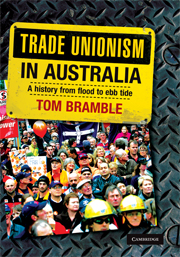Book contents
- Frontmatter
- Contents
- List of figures and tables
- List of acronyms
- Preface
- Introduction
- 1 Trade unionism in the postwar boom, 1945–67
- Part 1 The flood tide, 1968–74
- Part 2 The stand-off, 1974–83
- 3 Economic crisis and the halting of the flood tide, 1974–75
- 4 Unionism in the Fraser years
- Part 3 The ebb tide, 1983–2007
- Notes
- Index
3 - Economic crisis and the halting of the flood tide, 1974–75
Published online by Cambridge University Press: 05 May 2010
- Frontmatter
- Contents
- List of figures and tables
- List of acronyms
- Preface
- Introduction
- 1 Trade unionism in the postwar boom, 1945–67
- Part 1 The flood tide, 1968–74
- Part 2 The stand-off, 1974–83
- 3 Economic crisis and the halting of the flood tide, 1974–75
- 4 Unionism in the Fraser years
- Part 3 The ebb tide, 1983–2007
- Notes
- Index
Summary
The years 1974–75 mark an important turning point in this account of trade unionism. Up until this point unions operated in relatively buoyant economic circumstances. When they began to press seriously for reform in the late 1960s, the capitalist class had sufficient profitability to concede higher wages and an upgraded welfare state. From 1974–75 onwards, as the postwar economic boom subsided into a period of stagflation, the relationship between capital and labour became more fraught. Specifically, employers were driven by the deterioration in the rate of profit to attack the conditions of the working class, to resist reforms and, indeed, to seek to wind them back. Employers switched from a relatively accommodating to a more aggressive stance with regard to workers' jobs, wages and conditions of employment. The response of the working class to this offensive was not predetermined but was dependent on the politics of the labour movement, its leadership, the role of the activist layers and the moods of the broader working class. This chapter will explore the onset of the economic crisis, the response of employers, the actions of the Whitlam Government, the Governor-General's coup, and the reaction of the working class and its leaders to these developments.
The onset of economic crisis
The end of the postwar boom in Australia had its origins in a crisis of profitability in the world economy. The rate of return on investment in US manufacturing fell from 22.2 per cent in the 1960s to 16.8 per cent in the 1970s.
- Type
- Chapter
- Information
- Trade Unionism in AustraliaA History from Flood to Ebb Tide, pp. 75 - 94Publisher: Cambridge University PressPrint publication year: 2008



